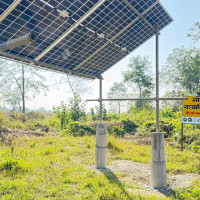- Thursday, 27 November 2025
Former Maoist combatants live comfortable life
By Bomlal Giri,Nawalpur, Nov. 27: The upheaval that Manoj Kumar BK underwent in his early life is highly shocking. Born in Bhimad, Tanahun, BK has been living permanently in Rapati Municipality-8, Chitwan. In 2001, he joined the 'people's war' waged by the Maoist when he was 10 grader. He became a member of the armed group to bring about tangible changes in society marred by caste discrimination, class inequality and injustice.
BK, who stood at the frontline of dozens of major battles, including Khara in Rukum and Beni in Myagdi, managed to survive, despite being almost killed in a clash with the then Royal Nepali Army at Darechowk, Chitwan, in March 2006.
“There was a two-hour clash with the army commandos at Darechowk. The army shot him four times in the head and legs and declared him dead. I pretended to be dead and lay alone in the forest for two hours without even breathing,” Bk said, recalling the old days. “I crawled to a shed some distance away and spent eight days there. When the party came in contact, my tribute programme had been completed everywhere. My pass code had also been made. After I was found alive, my family was very happy. At that time, 16 of my friends died."
On the occasion of the 24th founding day of the People’s Liberation Army of Nepal, all the fighters of the third and fourth divisions recently participated in the reunion and forest feast programme organised by the former Maoist fighters at Kawasoti-1, Pokhari Lake, Nawalpur. They remembered the past, talked about their present and imagined the future.
Bk, who managed to during the conflict period, now makes a good income by farming vegetables and rearing buffaloes in his village. “I have cultivated vegetables on two bighas, reared cows and buffaloes and have also earned a good income by selling milk,” he said. “Life has started to feel easy, I have also provided employment to 10 people.”
Kabiraj Kandel of Bhandara, Chitwan, was 18 when he joined the Maoist war in 1997. After the Comprehensive Peace Agreement, he went to Dubai for employment and spent 14 years there. He has now become a successful farmer by investing Rs. 500,000 he earned overseas in vegetable farming.
Kadel, who cultivated vegetables on an area of 20 bighas of land and later started buying and selling them wholesale. He now also exports vegetables abroad. "When the world is sleeping, I wake up at 2 am and go to the market, buy and sell vegetables until 10 am, and do business up to Rs. 700,000 a day," said Kadel. "I earn Rs. 500,000 to Rs. 700,000 per month, I have given employment to five people, it is not difficult if you work hard with honesty," Kadel said. He has become an example that if you work hard and diligently, you can earn well in Nepal, too. "In two years, I bought a house for Rs. 20 million, I have a car, and I have also deposited some money in the bank; life is becoming easier," he said.
Devi Prasad Dhakal 'Rabindra', who hails from Sindhuli, reached Pokhara in 2003 to work as a labourer. Shortly after, he joined the Maoists and became a combatant. In 2003, the Nepali Army arrested him and put him in the Gajuri Barracks in Dhading. He, who escaped from the barracks one year and 11 days after his arrest, is now busy with commercial vegetable farming and cattle rearing in Chitwan.
Birkha Bahadur Shrestha, a Maoist combatant from Jugal Rural Municipality of Sindhuli since 1999, sells seasonal vegetables and fruits from a cart in Kalika Municipality of Chitwan to support his family of seven, including five children.
Vijay Pariyar of Bharatpur 16 Saranpur, was diagnosed with colon cancer. Pariyar, who sacrificed his life for the country, says, “Even if I get cancer, I don’t want the country to get the same.” Pariyar, who worked in the technical field during the 'people's war', is still active in the technical field.
Tek Bahadur Budha of Baglung, who was the co-commander of the 3rd Division, 4th Battalion, lost both his fingers and one eye due to a small mistake while disposing of the bomb. However, he is still making a comfortable living by running his own business.
Former Maoist combatants who risked their lives for the country say they are still committed to the party. But some express sadness that the party leadership has not done what it should have done.
“There are problems in almost all political parties, including ours,” Pariyar said, “Everyone blames only the high-ranking leaders. The blame is not only on the top; the lower committees are also responsible for not being able to include everyone.” And they seem angry that the leaders have forgotten the people, seeking only their own good.















